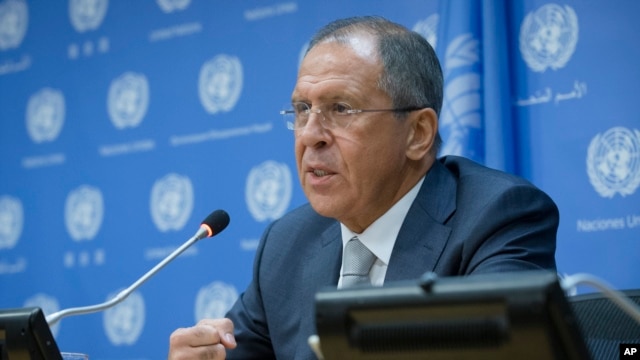Russia: Relations with US Need 'Reset 2.0'
Russia's foreign minister Sergey Lavrov speaks at a news conference during the 69th United Nations General Assembly at U.N. headquarters, Sept. 26, 2014.
Last updated on: September 28, 2014 9:36 AM
Russia's foreign minister said relations between Moscow and Washington need a “reset 2.0” - suggesting an apparent sequel to U.S. President Barack Obama's effort to improve ties with Russia in the early days of his administration.
In a Russian television interview airing Sunday, Sergei Lavrov blamed the United States for the strained ties between the two countries.
Lavrov said Russia wants to normalize relations with the U.S., but he said "it was not Russia who destroyed them."
Washington and the European Union have accused Moscow of being behind a pro-Russian rebellion in eastern Ukraine and have imposed several rounds of sanctions on Moscow for its role in the conflict as well as for its annexation of Ukraine's Crimean peninsula in March.
Criticizes US, NATO
In the television interview, Lavrov also lashed out at NATO's “Cold War mentality,” criticized Washington for excluding Russia's ally, Syrian President Bashar al-Assad, from its campaign against Islamic State fighters in Syria, and said Washington “can no longer act as the prosecutor, the judge and the executioner in every part of the world.”
“We are absolutely interested in bringing the ties to normal, but it was not us who destroyed them. Now they require what the Americans would probably call a 'reset,'” Lavrov said, according to an interview transcript on his ministry's website.
“The current U.S. administration is destroying today much of the cooperation structure that it created itself along with us. Most likely, something more will come up - a reset No. 2 or a reset 2.0,” he told Russia's Channel 5 television.
Shortly after Obama took office in 2009, his then Secretary of State Hilary Clinton presented Lavrov with a red “reset” button intended to signal a fresh start to relations that had been strained under Obama's predecessor, George W. Bush.
On Saturday, Lavrov, in an address to the United Nations General Assembly, said, "Washington has openly declared its right to unilateral use of force," and is "trying to decide for everyone what is good or evil."
Lavrov cited the 1999 NATO bombing of Serb targets in Kosovo, the 2003 invasion of Iraq and the 2011 NATO intervention in Libya as examples of what he called "arrogant [Western] policy."
He also described Russia's annexation of Ukraine's Crimean peninsula as a choice made by the Russian-speaking population there.
Immediately ahead of Lavrov's address, German Foreign Minister Frank-Walter Steinmeier called the annexation a crime - a characterization shared by Washington and the 28-nation European Union.
Steinmeier accused Moscow of having "unilaterally changed existing borders in Europe" and said Moscow "thus broke international law."
No mention of Ukraine actions
Lavrov made no reference to Western accusations that the Kremlin sent troops and heavy weaponry into eastern Ukraine to back the separatist rebellion near the Russian border. Nor did he refer to Western charges of Kremlin complicity in the July downing of a Malaysian airliner in Ukraine's airspace.
U.S. analysts said the aircraft, with 298 people on board, was destroyed by a Russian surface-to-air missile battery supplied by the Kremlin.
Moscow has denied involvement and insists Russian troops inside Ukraine in recent months were there on their own time and on their own volition.
Lavrov said that thanks to “initiatives of the Russian president,” the situation was improving on the ground in Ukraine, where a cease-fire has been in place for several weeks.
At the White House Saturday, Obama said the United States is leading a global effort "to rally the world against Russian aggression in Ukraine."
Obama also vowed that the United States and its allies "will support the people of Ukraine as they develop their democracy and economy."
Some material for this report came from Reuters



No comments:
Post a Comment